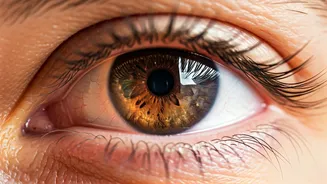Vitamins for Vision
Several vitamins are key for optimum eyesight. Vitamin A is essential; a deficiency can lead to night blindness and other eye issues. Good sources include
carrots, sweet potatoes, and leafy greens. Vitamin C, an antioxidant, helps protect against damage and may reduce the risk of cataracts and age-related macular degeneration (AMD). Citrus fruits, berries, and bell peppers are rich in this vitamin. Vitamin E, another antioxidant, shields eye cells from damage. It can be found in nuts, seeds, and vegetable oils. Consuming these vitamins regularly through diet can contribute to long-term eye health.
Minerals for Eyes
Certain minerals also contribute to vision health. Zinc helps vitamin A function properly and is found in meat, poultry, and beans. It plays a role in the function of the retina and may help slow down AMD. Lutein and zeaxanthin are antioxidants that help protect the eyes from harmful blue light. They are concentrated in the macula and lens. Foods like spinach, kale, and collard greens are excellent sources. Incorporating these minerals into your diet through a variety of food sources can support overall eye health and help maintain good vision over time. Regular intake of these elements is recommended for maintaining visual acuity and overall well-being.
Dietary Strategies Explained
Besides vitamins and minerals, your overall diet can greatly affect your eyesight. A diet rich in fruits, vegetables, and whole grains provides essential nutrients for eye health. Limiting processed foods, sugary drinks, and unhealthy fats can also benefit vision. Eating foods high in omega-3 fatty acids, like salmon and flaxseeds, may reduce the risk of dry eye and AMD. Staying hydrated is also crucial, as it helps maintain proper eye function. Consider consulting with a healthcare provider to understand specific dietary needs. Making informed food choices can help reduce the chance of developing age-related vision problems and support long-term eye health.
Lifestyle Tips for Eyes
Several lifestyle choices can help to keep your eyes healthy. Regular eye exams are crucial for early detection and management of any eye issues. Wearing sunglasses that block UV rays protects your eyes from sun damage and reduces the risk of cataracts and macular degeneration. Taking regular breaks when using digital devices, often referred to as the 20-20-20 rule—every 20 minutes, look at something 20 feet away for 20 seconds—can reduce eye strain. Managing conditions like diabetes and high blood pressure, which can affect eye health, is also important. Adopting these habits can improve and maintain your vision over the long term. Prioritizing these practices supports overall eye health.














